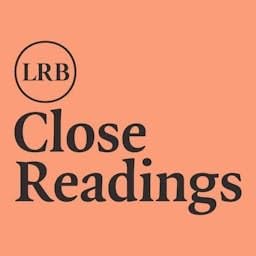We’re pleased to announce our four new Close Readings series starting in January next year: ‘Who’s Afraid of Realism?’ with James Wood and guests ‘Nature in Crisis’ with Meehan Crist and Peter Godfrey-Smith ‘Narrative Poems’ with Seamus Perry and Mark Ford ‘London Revisited’ with Rosemary Hill and guests Bonus Series: 'The Man Behind the Curtain’ with Tom McCarthy and Thomas Jones Episodes will appear on Monday every week, with a new episode from each series appearing every four weeks. Episodes from our bonus series, ‘The Man Behind the Curtain’, will come out every couple of months, either as extra episodes or live events: look out for announcements! If you're not already subscribed to Close Readings, sign up for just £4.99/month or £49.99/year to listen to these series plus all our past series in full: Apple Podcasts: https://lrb.me/crintro2026apple Spotify and other podcast apps: https://lrb.me/crintro2026sc Here are the works covered in each series: ‘Who’s Afraid of Realism?’ with James Wood and guests Flaubert, ‘Madame Bovary’ Dostoevsky, ‘Notes from Underground’ Stories by Anton Chekhov Tolstoy, ‘The Death of Ivan Ilyich’ Kafka, ‘Metamorphosis’ Woolf, ‘Mrs Dalloway’ Rhys, ‘Voyage in the Dark’ Bellow, ‘Seize The Day’ Nabokov, ‘Pnin’ Spark, ‘The Prime of Miss Jean Brodie’ Sharma, ‘Family Life’ Stories by Lydia Davis Riley, ‘My Phantoms’ ‘Nature in Crisis’ with Meehan Crist and Peter Godfrey-Smith Carson, ‘Silent Spring’ Schlanger, ‘The Light Eaters’ Czerski, ‘The Blue Machine’ Lovelock, ‘Gaia’ MacFarlane, ‘Is a River Alive?’ Kimmerer, ‘Braiding Sweetgrass’ Raboteau, ‘Lessons for Survival’ Moore and Roberts, ‘The Rise of Ecofascism’ Riofrancos, ‘Extraction: The Frontiers of Green Capitalism’ And more TBD ‘Narrative Poems’ with Seamus Perry and Mark Ford Marlowe, ‘Hero and Leander’ Shakespeare, ‘Venus and Adonis’ and ‘The Rape of Lucrece’ Milton, Book 9 of ‘Paradise Lost’ Pope, ‘The Rape of the Lock’ Coleridge ‘The Rime of the Ancient Mariner’ Wordsworth, ‘The Ruined Cottage’ and ‘Michael’ Keats, ‘The Eve of St Agnes’ Byron, ‘Childe Roland’ Clough, ‘Amours de Voyage’ Tennyson, ‘Enoch Arden’ H.D., ‘Helen in Egypt’ Set, ‘The Golden Gate’ Carson, ‘Autobiography of Red and ‘Red Doc>’ ‘London Revisited’ with Rosemary Hill Each episode will cover a period of London’s history and begin with a piece of writing. The first episode, on Roman London, will start with an extract from Dio Cassius’s account of the Roman conquest from his Roman History. ‘The Man Behind the Curtain’ with Tom McCarthy and Thomas Jones Cervantes, ‘Don Quixote’ Shelley, ‘Frankenstein’ Eliot, ‘Middlemarch’ Wells, ‘The Invisible Man’ Joyce, ‘Ulysses’ Pynchon, Gravity’s Rainbow’
Más
Menos
 19 m
19 m 14 m
14 m 17 m
17 m Nov 24 202518 m
Nov 24 202518 m 14 m
14 m 14 m
14 m 17 m
17 m 15 m
15 m
